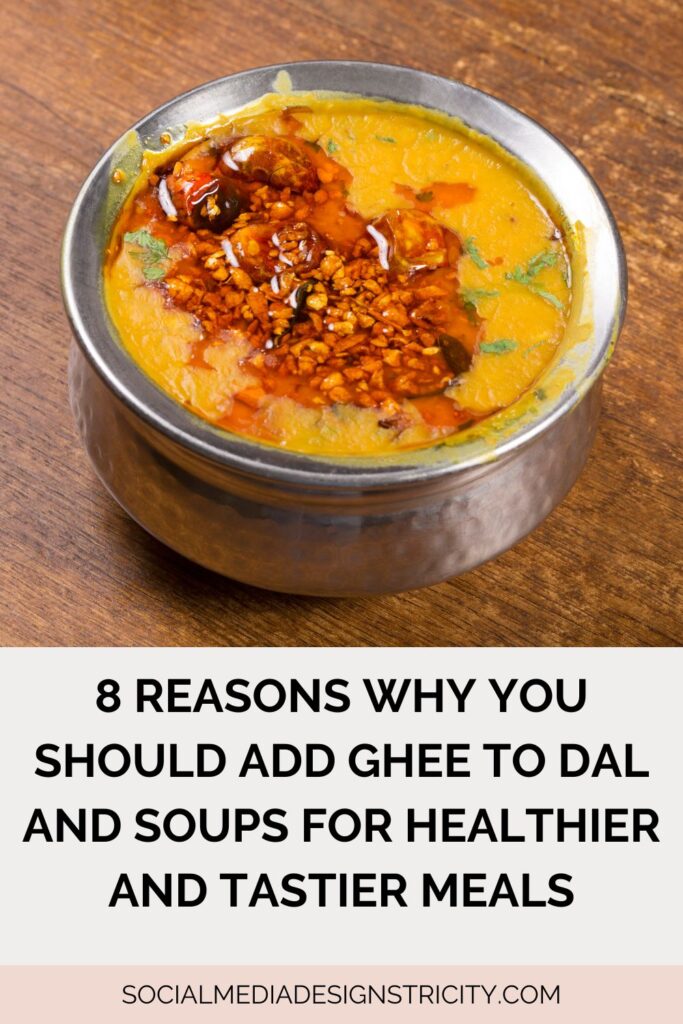Discover 8 reasons why adding ghee to dal and soups can make your meals healthier, tastier, and more nutritious. Ghee, or clarified butter, is very common in Indian cuisine and culture. It is most often added to dal (lentils) and soups, ghee not only enhances the taste of dishes but also has great nutritional value. Ghee is usually used in dal, and in this blog, we will see why it is also useful to add ghee to soups for taste and nutritional value.
1. Flavour Enhancement
A spoonful of ghee placed over hot dal or a bowl of ghee placed on top of a steaming hot bowl of soup completely changes the taste. Ghee adds a pleasant scent and also a nice creaminess, allowing dal and soups to taste even better. Ghee itself is a unique ingredient in that it converts even a simple – wikipedia style – combination of dal-chawal to a wholesome, aromatic, amazing tasting meal. The same applies for soups – ghee completely transforms the texture and flavor to higher levels.
2. Enlistment against Constipation
Ghee is often recommended as a food that helps with digestion. It helps in the secretion of various enzymes which are required to digest complex foods, like lentils, which may lead to flatulence in some. Ghee also facilitates inactive assimilation and enables faster bowel movements, making it a good option for people with spastic colons. When ghee is included in dal or soups, it does not only assist in the processes of digestion, but also confers a sense of calm to the stomach, and hence, the digestive flora is in equilibrium.
3. Weight / Fat Reduction
Ghee is abundant in fat soluble vitamins which are A, D, E and K. Such constituents are vital for the body’s functionality and, ghee assists in the absorption of vital nutrients from the food ingested, for example, lentils and spices contained in the dal. Moreover, ghee also helps in the incorporation of curcumin contained in turmeric which is common in dal. Further, incorporating ghee into soups can likewise maximize effective absorption of such critical nutrients thus enhancing the nutritional value of the meals.
4. Fats That Are Healthy for Heart
Ghee is a source of healthy fats which contribute to lowering LDL (Low-Density Lipoprotein aka bad cholesterol) and increasing HDL (High-Density Lipoprotein aka good cholesterol) levels, leading to a healthier heart and a reduced risk of cardiovascular diseases. Ayurveda has been recommending ghee for a long time for its anti-inflammatory properties which help alleviate joint pain and combat heart diseases. Include more ghee in your dietary practices while eating dal or soups so that you can raise the amount of heart-healthy fat in your body.
5. Aids in Weight Loss
It is a fact that ghee is a calorie dense food yet if taken in moderate quantity it can help in weight loss. The calories in healthy fats such as ghee may also satiate your appetite, making you less likely to reach for snacks or other items when not mealtime. Ghee has been shown to assist with taking in smaller meals when added to dal, rice, or soups and satiety when watching how many calories are consumed so that weight management becomes easier. If you are seeking to lose weight, adding ghee to your soups is a great way to compliment your weight loss goals.
6. Immunity Booster
Ghee comes with many health benefits and it is particularly rich in short-chain fatty acids. Butyrate is most probably the most powerful butyrate that encourages gut health. Gut health is inversely related to the immune system so having a strong gut helps in boosting immunity. Ghee is also beneficial because it increases the number of good bacteria in the gut. As a result, your immunity is improved and you are more resistant to common seasonal issues and infections. You can add ghee to dal or soup and it not only protects your gut health but also enhances immune response against diseases.
7. Enhances Flavor
Ghee makes dishes taste extremely rich and gives them a glorious smooth lip Thanks to ghee, dal has a creamy texture and is more rich-tasting without the desire to use cream. For soups, ghee works as a substitute for cream and it provides a more exquisite and rich feeling to the dish without making it heavy and hard to digest. Adding Ghee not only creates better consistency- the taste of the meals is so much better that it feels like a nice treat.
8. Reduces the High Heat
Should you find yourself cooking a dal or soup and it becomes stingingly hot, warm it up with some ghee to ease the heat. Being a source of fats, ghee assists in ‘cooling down’ the spice level of the dish, ensuring that the hotness of the food does not overwhelm the whole dish. Those who have hot soup or dal can find it pleasant to eat a spoonful of ghee that has a soothing effect on the seeking taste.
In conclusion
Including ghee in the chores, it comes in handy for dal, curries, soups, every other dish increases the goodness of the meal on multiple levels. Ghee has so many incredible superpowers: it is nutrient-dense, healthy fat with antioxidants, aids in digestion, improves immunity, and even can help with weight loss. Incorporating this superfood ghee into every meal brings in more taste and nutrition without so much effort balanced on the palate and the body. Therefore, the next time you make dal or soup, remember to sprinkle a teaspoon of ghee on top for that added enhancement!


